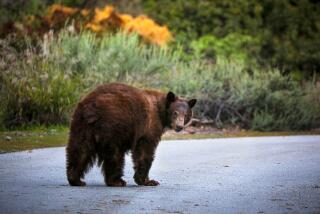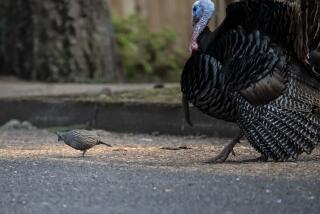The Hunt
- Share via
“Turkey season?” says one notoriously successful turkey hunter over the phone. “Don’t think we have a turkey season in these parts.”
“Turkeys?” says a black-powder hunter about to go to his club’s annual turkey shoot. “I don’t think there are any turkeys around here.”
Just as pets begin to resemble their city-dwelling owners and vice versa, so too does the wild turkey hunter begin to resemble his crafty adversary.
“Cleveland National Forest?” says the sunny hotel proprietor in the town of Alpine in southern San Diego County and minutes away from the border of the Cleveland National Forest. “I’m sorry, honey, I’ve never heard of it.”
“Map of the area?” says a clerk in the bookstore in Alpine. “Why would I carry a map of the area? I live here.”
Turkeys are watching.
“You’re in the high country now,” Cuyamaca State Park Ranger Shane Coles tells me. “A lot of people don’t think much of city folk.”
I’ve been invited to an annual turkey shoot by a group of black-powder hunters on private land in Descanso, not far from Alpine. We are to meet--low profile--at the park-and-ride off the Japatul exit on Interstate 8.
Daryl Paige, a forest service employee for 32 years in Cleveland National Forest and a member of the San Diego County Muzzle Loaders Assn., explains that there are two classes of black-powder hunters: the ones who dress in period costume and use old-style muskets; and the ones who use modern rifles with scopes.
Traditional black-powder hunting, explains Paige, brings you closer to the prey. Without a scope, you have to get within 50 yards of the turkey. It takes longer to reload, so you have to get it the first time, particularly hunting clever turkeys. Before each shot, powder and shot are loaded through the muzzle of the rifle.
The hunters’ attention to period detail is keen, their enjoyment of the outdoors obvious. But, the regulations that govern their sport make them downright twitchy.
“These guys are usually on the up-and-up,” says Monty Lunkley, a forest service law enforcement officer from Sacramento, in the area on a top-secret mission unrelated to turkeys, who happens to be staying at the same hotel where I’ve bunked for the night.
The San Diego County Muzzle Loaders have around 30 members. Doug Ruff, the president, agrees to meet me Sunday morning before the annual turkey shoot. He is wearing buckskins modeled on those worn by the mountain men from Colorado who traded furs in the early 1800s.
Rick Baskin and his wife, Barb, also members, join us at the park-and-ride. Ruff is extremely nervous about the meeting. Club members have decided that I should not come on to the private land where they meet, even though one ex-member has committed the sin of giving me directions to the land.
Different members give different reasons for their concern. One says liability. If I fall down, I might sue them. Another says it’s all the bad press from journalists and angry environmentalists and anti-gun people and animal-rights people. Another tells me they are afraid of getting in trouble with local forest rangers.
Even though the muzzle loaders hark back to an earlier style of hunting, they must maneuver amid a patchwork of modern regulations. I go to the state Department of Fish and Game Web site to read them. They are exhaustive. It’s enough to make you eat frozen turkey.
There is private land, there is state park land, national park land and Bureau of Land Management land. Which means that sometimes a hunter trying to get to legal land can’t carry his gun across a field where it is illegal to hunt. On this chessboard, turkeys and turkey hunters stalk each other--the turkeys free of regulation.
If you blow it, says Carl Constantino, the law can come down hard. “These guys can take everything you own. Your gun, your car, your freezer, everything.”
Hunting permits--or tags--are issued by Fish and Game.
“It’s almost impossible to get tagged for turkey,” Baskin says.
Not so, says Travis Vuich of Fish and Game in San Diego. Anyone can get permission to hunt turkey, he said. You simply get your tag for upland game stamped for turkey. “I’ve never heard of a special turkey tag in the state of California.”
The turkeys are watching. Laughing.
Molly Featheringill, a volunteer at the museum in Cuyamaca State Park--where turkeys are frequently spotted--thinks that turkeys, smart as the dickens, made their way down to the state parks where they couldn’t be hunted.
Black-powder hunting is addictive, says Doug Ruff, who carries, among other things, a medicine pouch and a priming horn that holds powder and is inscribed “Doug Ruff. His Horn. Fight For Liberty.”
“You start going to the meetings,” Ruff says, “and the next thing you know, you’re molding your own bullets.” He gives me one.
“What could this kill?” I ask.
“Just about anything,” he says.
We all look across the freeway from the park-and-ride at two hunters carrying rifles and wearing Eddie Bauer-style garb as they jump over a fence and head into a field.
“What are they hunting?” I ask.
Ruff and Rick Baskin look at the ground. “Don’t know,” they shrug. “Could be pheasant. Maybe quail.”
Turkeys are chuckling in the coastal oaks, the manzanita.
When I ask about poachers, Vuich of Fish and Game tells me this story:
“In Ramona, they’ve got these great big toms. One day, nowhere near hunting season, I saw the biggest tom I’ve ever seen strutting through town with an arrow through his chest. He was flying with it! Someone had clearly tried to poach him and failed.”
A chilly breeze ruffles the pines. There’s snow in patches on the ground as we make our way up Route 79 toward Julian and home.
The turkeys here are smiling, safe, on park land.
Down in the southern reaches of Cleveland National Forest, there are probably some black-powder hunters chowing down on wild turkey in a savory juniper broth while we cityfolk eat our store-bought birds.
More to Read
Sign up for The Wild
We’ll help you find the best places to hike, bike and run, as well as the perfect silent spots for meditation and yoga.
You may occasionally receive promotional content from the Los Angeles Times.






